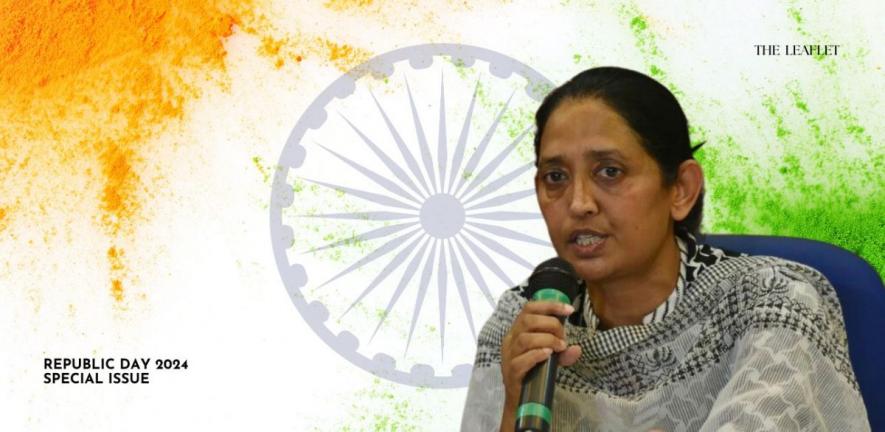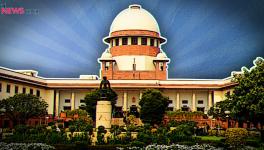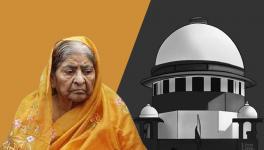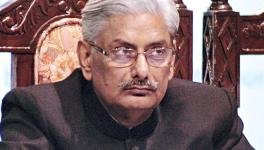Courage’s Counsel: An Interview with Bilkis Bano’s lawyer Shobha Gupta

Shobha Gupta, who has been representing her for more than two decades, calls Bilkis Bano the embodiment of “Himmat” (Courage). In this exclusive interview, Courage’s counsel shares her thoughts on the case, Bilkis Bano, and what has changed during these years in the courts and outside them.
—
The determined Shobha Gupta was recently designated as a senior advocate by the Supreme Court at the age of 54. She has been a standing counsel for the National Human Rights Commission for a decade and a half and is widely regarded as one of the most courageous and fearless members of the Supreme Court Bar.
The Leaflet spoke to her on the Bilkis Bano case, and how the world has changed around the case over the years.
Q. For how many years have you been involved in the Bilkis Bano case?
A. Since 2003, so for almost 21 years now.
Q. What made you pick up the case in the first place?
A. Actually, I did not pick up the case. Justice (Adarsh Sein) Anand (the 29th Chief Justice of India), who was the chairperson of the National Human Rights Commission at that time, had met Bilkis Bano in a relief camp. The Gujarat police had filed a closure report before a magistrate who had closed the matter.
Justice Anand asked Ashok Arora, the secretary of the Supreme Court Bar Association at that time, to suggest a lawyer who could take up the case and pursue it fearlessly— someone who was not prone to succumbing to pressure.
A lawyer asked me, what is this about? Have you suffered something personally? I couldn’t get his question. Does one need to have suffered personally to be sensible and sensitive on such issues?
I was hardly five years into practice at that time. Nevertheless, my name was suggested and I was asked to file a petition in the Supreme Court. That is how I came to take up the case.
Q. So at that time you were just beginning to find your feet in the profession, and this case has been with you for a major part of your career. What has the case come to mean to you over the years?
A. You know, I have had a long engagement with the cause of women’s empowerment. Because of my work, and because of Biklis Bano’s case, a lot of people consider me a fearless and tough person.
But if they are showing a child or woman in distress on TV, I cannot watch it without crying. It is that easy for me to cry.
When the Kathua rape and murder happened, whenever I sat down to watch TV with my mother, I could not stop my tears at the revelation of the details of how a nine-year-old girl was mercilessly raped and murdered. I used to cry inconsolably.
At one point, even my mother was taken aback and she asked me, why are you crying like this? It took me time to take control of my emotions.
Some lawyer friends keep asking me, why does an emotional person like you get entangled in cases like these? I run a forum for women, ‘We The Women of India’. We provide pro bono services to women.
A lawyer asked me, what is this about? Have you suffered something personally? I couldn’t get his question. Does one need to have suffered personally to be sensible and sensitive on such issues?
A few years after I had taken up the case, I realised that it had made a difference in my approach. It has made me more sensitive. Maybe because from a very young age, I have read the facts. The pain might not have been directly inflicted on my body and mind, but I have lived under its shadow too.
So that might have changed me as a person. It might have made me more sensitive towards all these issues.
Maybe my agitation and inner voice when it comes to crimes and ill-treatment of women would have been the same without the case as well, but leaving speculation aside, the Bilkis Bano case has played a big role in strengthening my voice and engagement with such issues.
Q. So crimes against women were not an area of focus for you before you took up Bilkis Bano’s case?
A. It was not, and it has not been even after that. I take up a wide variety of cases. Even at the time when I took up the Bilkis Bano case, I used to take up cases related to service law, eviction, civil matters, criminal matters… I worked under seniors who used to do all sorts of matters, education matters, for example. In fact, if you ask me what my focus area is, it is education matters. That is a favourite subject of mine.
The Bilkis Bano case has played a big role in strengthening my voice and engagement with issues of crimes and ill-treatment of women.
When the Bilkis Bano case came to me, I did what a lawyer has to do. Rationalise things and put them in the right perspective. Read the facts carefully and put them next to the law. Apply the law and put it to the court. But it has never been my expertise area.
Q. When the Supreme Court quashed the remission of the 11 convicts in the case recently, many celebrated the decision with hyperbole. The counter-argument was that the court had just done its bare minimum and it did not call for laudatory and celebratory commentary. What is your take on it?
A. I remember this one time when I was praising Yakub Rasul (Bilkis Bano’s husband) in a press conference, for standing by her along with his family all through these years.
There were many social workers at the conference. One of them got up and asked me, “Why are you praising Yakub for being alongside Bilkis? What has he done that is so extraordinary and different?”
A male companion or a husband is supposed to stand by his wife and support her, just like a wife is supposed to stand by her husband. That is the bare minimum. If someone does not do even that, they need to be criticised.
If someone does work at an office diligently, that is not something to be praised. If you don’t take leaves, it is your choice, but you should not expect to be praised for it.
But it is also human nature that we praise something that might have become a rare occurrence, even if it is supposed to happen during the ordinary course of life and business, especially the business of justice, which is our profession.
Sometimes we celebrate such tiny victories because of our fear. For example, in a cricket match, if the number of runs required is much lesser than the number of balls remaining, and you still have some batting left in the dugout, still people sit at the edge of their seats on their toes, apprehending that the match may slip out of their hands.
Secondly, maybe the courts are failing to do what they were supposed to do as the bare minimum.
Q. What are the major changes you have witnessed in the judiciary during the years you have been part of this case?
A. There have been some major shifts, some visible and others more difficult to discern. When I took up the case, I remember judges would jump from their seats when the case was first argued. There was so much anger and shock in their reactions to such a crime that it was heartening to see for a young lawyer.
The courts were much more approachable. There used to be a very straight message from the judges. Citizens could expect good Orders in quick time and express anger over what was happening then and there rather than go through complicated court procedures every time.
When the Bilkis Bano case came to me, I did what a lawyer has to do. Rationalise things and put them in the right perspective. Read the facts carefully and put them next to the law.
The Supreme Court has been consistent with that approach, except in the recent past when we went to it as a collective of lawyers when students of Jawaharlal Nehru University and Jamia Millia Islamia were attacked, we did not get a similarly prompt response from the court.
Usually, when it comes to fundamental rights and liberty, the court is very prompt, but that was a rare occasion when the Supreme Court asked us to approach the high court.
Generally speaking too, the Supreme Court has become a tad bit more procedural, although I am not in a position to make a judgment on whether that makes it better or worse.
As I said, earlier occasions when you did not have a written petition but could still approach a Bench were more frequent. One could just mention a matter at 10:30 a.m. and get a response from the court. The judges would say, just hand over a sheet to me and get to it.
For example, in 2018, when a law student said her life was in danger, a video was circulated among lawyers in the court and we quickly drafted a letter petition and went to the Chief (Justice of India)’s court where we got a positive response.
Today, I think there is less of a possibility of just rushing into a courtroom. The system of mentioning has become more formal. The government, when it is the respondent, reacts differently. There is so much media attention. The atmosphere is not as pure as it used to be.
The lawyers of today also lack the courage of the Bar two decades ago, and when the seniors do not set an example, the juniors learn to be more subdued as well.
Q. What do you think is the reason for all these changes?
A. One major reason is that the judges are overworked. They always have so much pressure of work on them. Every single judge is under a lot of pressure. The workload of every judge is immense, beyond human capacity.
This has necessitated the introduction of more procedures to streamline things and ensure optimum utilisation of the court’s time.
But human rights defence is a business of the soul. You have to feel it. You have to get hurt. If I as a lawyer feel the pain, I have to convey it to the judge. They have to feel it too. This process takes time.
A male companion or a husband is supposed to stand by his wife and support her, just like a wife is supposed to stand by her husband. That is the bare minimum. If someone does not do even that, they need to be criticised.
Once you have mechanised everything because of the work pressure, there is an urgency to finish things faster. That kind of system is not conducive to human rights defence.
But you have to agree with me that the current Chief Justice has played a major role in bringing the soul back into the proceedings of the court. Not just him, certain other judges are also doing a commendable job, despite the work pressure.
Q. What role has live streaming played in terms of these changes?
A. Live streaming and the more general escalation of media attention to court proceedings is, of course, a factor, but once video conferencing was started, it was an inevitable reality. If being under the public gaze through live streaming is bringing some heat, I think it is only a temporary situation. It is only a matter of time before the courts adjust to this new reality.
Ultimately, in my opinion, the courts will balance the need for transparency with the need to ensure the integrity of the court processes. There has to be a limit to the transparency of court processes in a country like ours, we cannot have the justice of the town square. But I am confident the judiciary will take care of this matter in the long run.
Q. What is your perspective on the social changes during this time? In particular, do you think that the shift in the dominant political narrative in India, which made it seem ‘normal’ that the convicts in the Bilkis Bano case were garlanded when they were released upon remission of their sentence, while social media is full of commentary on how Bilkis Bano and her family deserved what they got, justice for her has been permanently deferred?
A. I do not think that is the case. The people who subjected Bilkis Bano and her family to those atrocious crimes have been punished and they are spending their days behind bars as a consequence of their actions.
Look, in a criminal case, in any court case, for that matter, there are two sides. The criminal has a right to say they are innocent and they did not commit the crime—
Q. —My question is slightly different. It is not about the right of the accused to defend themselves but questioning the law itself, saying what the law proscribes as a crime is not a crime at all.
A. I am coming to that. There will be opinions like that. There always are. But the fundamental question is what do the courts do? Do they deal with the matter as per the law or as per such opinions? Obviously, as per the law, and if a party is aggrieved by the decision of the court, it is free to approach a higher court.
I do not think justice for Bilkis Bano has been “permanently deferred”. She got closure in 2008, when the conviction first took place, and then again in 2019 when all appeals filed by the convicts were dismissed. Recently, we have seen again that the law has taken its correct course.
When I took up the case, I remember judges would jump from their seats when the case was first argued. There was so much anger and shock in their reactions to such a crime that it was heartening to see for a young lawyer.
The convicts had been remitted as per fraud and the Supreme Court has corrected it.
You see, even the Gujarat remission policy, which does not apply to the convicts in this case because their trial took place in Maharashtra does not allow remission in such heinous crimes, so there is no question of justice being deferred.
Once they surrendered, I called Bilkis Bano and said, please allow yourself to have a sigh of relief. Allow yourself to live peacefully. Allow yourself to live without any fear. Just try to live a normal life. Enjoy the life of a regular citizen of this country living under the reassuring shade of the Constitution.
Q. Finally, what has Bilkis Bano come to mean to you personally after all these years? What does a long-term client–counsel relationship look like, especially in a case like this?
A. You know, I have not done much for her. I have done the Supreme Court work for her, but most of the handholding was actually done by the social workers who stood by her, took care of her and protected her.
They are the ones who ensured she had two meals a day. That her children had two meals a day. That they get an education. All of this was done by the social workers, not by the State.
Then there are the lawyers who have represented her in the trial court and the high court. They have done excellent work for her.
Human rights defence is a business of the soul. You have to feel it. You have to get hurt. If I as a lawyer feel the pain, I have to convey it to the judge. They have to feel it too. This process takes time.
Personally, I have a very, very special connection with her. I may not have been the biggest of presences in her life during these years, nor may she have been in mine, but I have a humongous soft corner for her.
I value her a lot. She means so much to me. She is the epitome of resistance, conviction and untiring perseverance. She embodies the name “Himmat”.
Anybody who has met her even once will have a similar kind of attachment to her. They will feel care and concern for her. Through her courage and her indefatigable will to live, she engenders those emotions in people.
I value Bilkis Bano a lot. She means so much to me. She is the epitome of resistance, conviction and untiring perseverance. She embodies the name “Himmat”.
Recently, I told her that I want to take care of the education of her children. I want to see her daughter study law and sit on the chair on which I am sitting right now and run this office like I do at present.
I want her children to use her name in her surname so that the world knows that they are the children of this brave woman.
Arif Ayaz Parrey is Editor, The Leaflet.
Get the latest reports & analysis with people's perspective on Protests, movements & deep analytical videos, discussions of the current affairs in your Telegram app. Subscribe to NewsClick's Telegram channel & get Real-Time updates on stories, as they get published on our website.
























